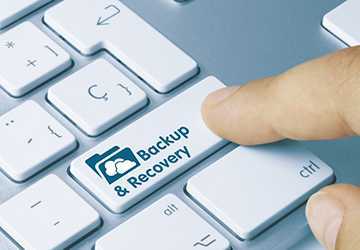5 Best Practices for Data Backup and Recovery
Imagine the devastating feeling of losing all your valuable data (family photos, important documents, and business files) instantly. This is a nightmare scenario.
But what if we told you that some best practices can protect you from such disasters?
This blog post will walk you through 5 best data backup and recovery practices. Your digital security is just around the corner.
Let's start!

Why are these solutions needed?
Have you ever wondered what would happen if your computer crashed or your smartphone was stolen? Data loss is more common than you think and can have catastrophic consequences.
From personal memories to critical business information, data is the lifeblood of the modern world. Data backup and recovery practices are your safety net, ensuring that your data remains intact even in a technical incident or cyberattack.
This blog post covers five essential practices to protect your data and give you peace of mind.
So, let's see how these practices can help you with data backup and recovery!
Protect your data: 5 important backup tips
Losing data can have catastrophic consequences. Protecting your data is crucial as it is a safety net for your digital life. It ensures your data remains safe even if something goes wrong.
Take these necessary steps to protect your data now, and you'll be grateful.
Back up your data regularly
The foundation of any robust data backup strategy is regularity. Continuously protecting your data is like watching your home with a reliable lock. It is the first line of defense against data loss.
By creating regular backups, you can protect your information from unexpected disasters. Make backing up your data a part of your daily routine, whether daily, weekly, or monthly. It's a small effort that yields enormous rewards.
Before implementing this method, ensure you know precisely which data is critical and needs immediate attention in the event of data loss.
Choose a reliable backup solution
Not all backup solutions are created equal. Choosing a reliable, trustworthy backup service is crucial. The market offers a variety of options, from external hard drives to cloud-based solutions. Do your research and choose one that suits your needs and budget.
When evaluating backup solutions, consider security, ease of use, and scalability. Your service should offer strong encryption to protect your data from prying eyes, provide a user-friendly interface, and grow with your needs as your data storage needs increase.
Remember that your backup solution should be regularly updated and maintained to ensure it is secure and functioning correctly.

Test your backups regularly
It requires more than just creating a backup. It's also important to regularly test backups to ensure they can be restored successfully. Imagine the frustration of discovering that your backup is corrupted or incomplete when you need it most.
Test backups will help you identify and resolve issues before data loss occurs. Create a recovery test plan and document results.
Before implementing this approach, consider what methods you will use to test your backups and how often you will perform these tests.
Implement a data retention policy
Over time, data accumulates, and it may not be necessary to retain it. Implementing a data retention policy will help you manage your data more effectively.
Specify how long different data types should be retained, archived, or permanently deleted. This approach helps reduce storage costs and ensures your backups remain manageable and organized.
Before implementing this practice, please carefully review the legal and regulatory data retention requirements that apply to your situation.
Stay up to date with the latest developments in cybersecurity
Data recovery isn't just about creating backups but also protecting them from threats. Stay current on cybersecurity threats and best practices for protecting your data.
Use strong, unique passwords and enable two-factor authentication when possible. Update your software regularly and take strong security measures to prevent unauthorized access to your data.
By staying informed about cybersecurity information, you can reduce the risk of a data breach and increase the security of your backup solution.
Diploma
In a digital world where data is king, the importance of data backup and recovery cannot be overstated. You can keep your valuable information safe and secure by following 5 data backup and recovery best practices.
Remember, data is the lifeblood of your personal and professional life. Can you take action today to protect it? Your digital world will be safer, and you'll have more peace of mind.
Data backup and recovery is your insurance for the digital age. So why wait? Take action now to protect your digital life. Your data will thank you!
Related Posts
- How To Troubleshoot Common Problems With Your Printer?
- Top 5 Graphics Cards for Video Editing in 2023
- What to Look for in Gaming Monitors for Professional Gamers?
- When to Upgrade Your Smartphone for Maximum Efficiency
- 6 Tips for Choosing the effective Graphics Card for Gaming
- How to Properly Maintain Your Laptop for Longevity